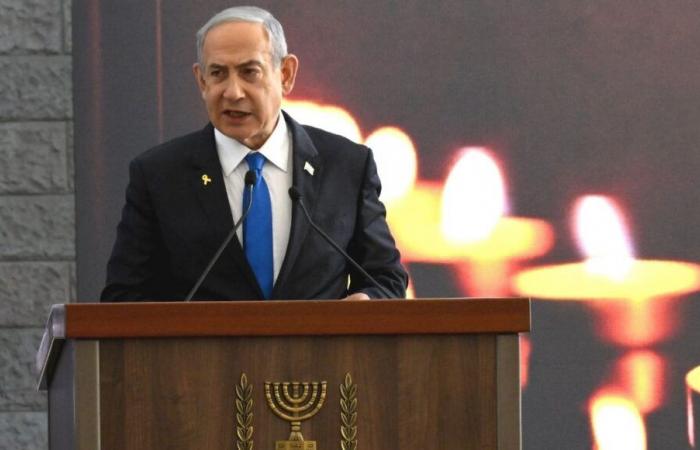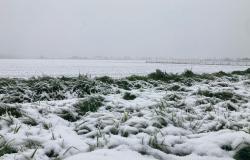This Tuesday morning, the Israeli press is wondering if a leak of documents compromised the release of hostages in Gaza. The affair, nicknamed “Israeli Watergate” by the daily Maarivshakes the Prime Minister's office, we can read in the columns of the Globe.
Last September, after the announcement of the murder of six Israeli hostages held by Hamas, protests for an agreement on their release reached unprecedented levels in Israel, explains Haaretz in an article detailing each stage of the case. According to the Tel Aviv-based daily, Benjamin Netanyahu used secret documents attributed to Hamas and leaked them to the German tabloid Bild and the British Jewish Chronicle to undermine the protests, suggesting that the demonstrators were “fell into Hamas’ trap”.
The documents claimed that Hamas planned to smuggle Israeli hostages into Egypt, aiming to derail any ceasefire agreement, reports the BBC.
On Friday, the Rishon LeZion court said several people were arrested last week on suspicion of security violations related to the unauthorized disclosure of classified information. Among them, one of the spokespersons of Benjamin Netanyahu, close to the Prime Minister, recalls Haaretz.
France Culture goes further (the Morning Guest) Listen later
Lecture listen 15 min
A case which caused the Israeli opposition to react, like Yaïr Lapid. The opposition leader held a press conference on Sunday relayed by Middle East Eye. “The details authorized for publication in recent days regarding the serious security affair at Netanyahu's office should alarm all Israelis. Netanyahu's associates are suspected of leaking secret documents and forgetting documents classified in order to compromise a possible release of hostages and to lead a media campaign against the hostages' families. The matter started from the Prime Minister's office and the investigation must determine whether these were orders coming directly from the Prime Minister. Prime Minister. If Netanyahu knew, he is complicit in one of the most serious security failures ever seen. If Netanyahu didn't know, then what does he know?asks Yaïr Lapid.
This weekend, families of hostages joined the call launched by Israeli journalists to know the nature of the documents. Dana Pugac is one of the lawyers for the families interviewed by Reuters : “For a year, they have been waiting for information or information on the negotiations for the release of these hostages, declares the lawyer. If some of this information was stolen from the army, we believe that the families have the right to be informed of any relevant details.”
In the Jerusalem Postsome families denounce a “poisonous campaign against the relatives of the hostages” et “a stab in the back of the nation!” What Israel needs today, more than ever, is a strengthening of its control and verification system, so that this never happens again, concludes the Israeli newspaper.
In South Africa, the brutal arrest of illegal miners causes the population to react
As part of a massive operation to combat illegal mining, nearly 600 miners known as “zama zamas” (“those who try their luck” in Zulu) were arrested on Sunday in the gold mining town of 'Orkney, in the district of Klerk-sdorp, indicates Senenews.
Journal of 18h Listen later
Lecture listen 10 min
Over the past week, reports the BBCpolice blocked food and water deliveries in an attempt to force them to leave the mine. Hungry and dehydrated, the minors were forced to resurface, police say.
A strategy described as “brutal” by Senenewseven “inhumane”, for local residents interviewed by the South African newspaper The Star. “A war against the attempts of thousands of unemployed slum dwellers to earn a living, given the lack of jobs in the country”deplores a resident of Khuma a few kilometers from Orkney, in the columns of the South African daily.
Drug seizures are on the rise in South Korea
According to South Korean customs, attempts to smuggle drugs into the country increased by 24% this year compared to last year, reports The Korea Times. Between January and September, customs authorities seized 574 kilograms of drugs at the border, enough for 19 million people to consume them simultaneously, the daily underlines. Dong-a Ilbo.
It is mainly small quantities – less than 10 grams – which have been seized from travelers or in international mail, said a customs service official, often for their own consumption, specifies the press agency. Yonhap.
At the top of the seizures, methamphetamine with 338 kilograms, then cocaine 62 kg and cannabis 46 kg, indicates Dong-a Ilbo. A ranking explained by a constant demand for methamphetamine and the high market price in South Korea compared to other countries, specifies the Korean daily.
In the past, only certain groups, such as criminals, some international students, the rich and famous, were known to be exposed to drugs in Korea, analysis Sciencedirect.com. However, it can now be confirmed that the drug has deeply penetrated the lives of ordinary people, the scientific site adds. According to a report by the National Police Agency in 2022, the number of teenage offenders more than tripled in five years, highlighting that teenage drug abuse is a major social problem in South Korea today.
If you have any questions on any of the topics in the international press review, write to us at [email protected]. We will answer it in the International Press Review on Saturday. You can also subscribe to the news channel of La Revue de presse international de France Culture on WhatsApp.






